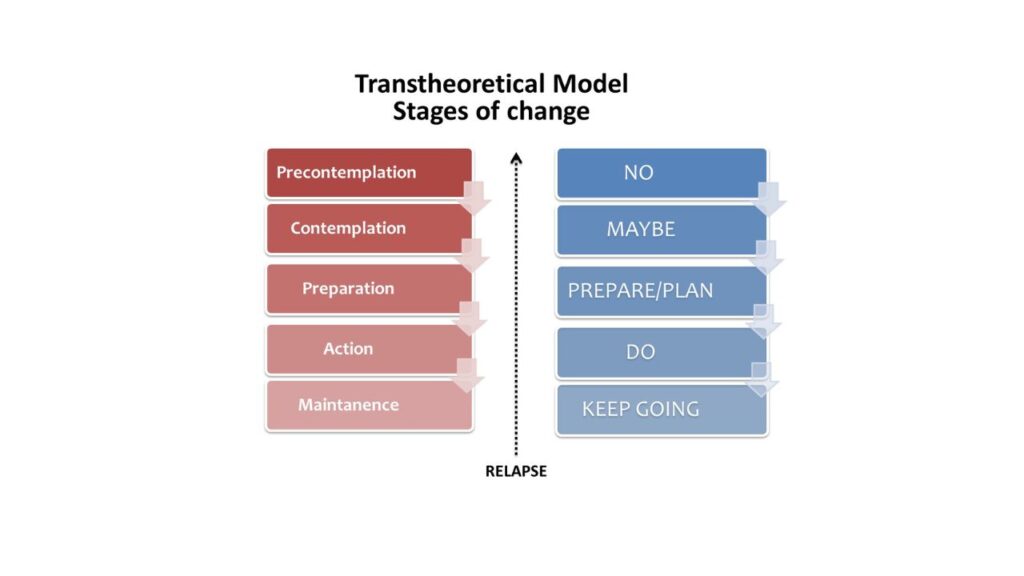The journey to recovery from addiction isn’t linear. Understanding this fundamental truth led psychologist James O. Prochaska to develop one of the most influential models in addiction treatment: the Stages of Change. This framework continues to shape how treatment centers approach recovery, including our work at The Bluffs.
James Prochaska: A Pioneer in Behavioral Change
James O. Prochaska emerged as a leading figure in psychology through his work at the University of Rhode Island, where he served as director of the Cancer Prevention Research Center. His research in the 1970s focused on understanding how people modify problematic behaviors, leading to the development of the Transtheoretical Model of Change. This groundbreaking work has transformed how treatment providers approach behavioral change, especially in addiction recovery.
The Prochaska Stages of Change Model Explained
The Stages of Change model identifies six distinct phases people typically progress through when making significant behavioral changes. During the initial precontemplation stage, individuals may not recognize their substance use as problematic. They often minimize concerns raised by others and show resistance to change. This stage requires careful, non-confrontational approaches to help individuals begin considering the impact of their behavior.
As people move into contemplation, they begin acknowledging their substance use as problematic. During this phase, individuals start weighing the pros and cons of changing but haven’t committed to taking action. This stage often involves significant ambivalence and can last for extended periods as people process their situation.

The preparation stage marks an important shift, as individuals accept the need for change and begin making specific plans. During this time, they might research treatment options, reach out to healthcare providers, or make initial attempts to modify their behavior. This planning phase sets the foundation for successful change.
When individuals enter the action stage, they implement concrete changes such as entering treatment, stopping substance use, and actively engaging in recovery activities. This stage requires the most visible effort and external support, making professional guidance particularly valuable.
The maintenance stage focuses on sustaining the changes made during the action phase. During this time, individuals work on preventing relapse, developing healthy coping mechanisms, and building a sustainable recovery lifestyle. This stage requires ongoing commitment and support.
Some individuals reach the termination stage, where the old behavior no longer poses a significant temptation and new healthy patterns become automatic. While not everyone reaches this stage, it represents an important possibility in the recovery journey.
Application in Addiction Treatment
Understanding these stages helps treatment providers meet clients where they are in their recovery journey. At The Bluffs, we incorporate this model through individualized assessment, stage-appropriate interventions, and flexible treatment planning that adapts as clients progress. Our approach recognizes that each person moves through these stages at their own pace, requiring personalized support throughout their journey.
The Bluffs Approach to Stage-Based Treatment
Our treatment programs recognize that recovery progress varies among individuals. We begin with comprehensive initial assessments to determine readiness for change, then provide motivational enhancement therapy for early-stage clients. As clients progress, we offer targeted skill-building workshops and develop continuing care plans based on their stage progression. This structured yet flexible approach allows us to support clients effectively throughout their recovery journey.
How Understanding Prochaska’s Stages of Change Supports Recovery
The Stages of Change model provides valuable insights for both treatment providers and individuals in recovery. Understanding these stages helps normalize the change process and reduce shame around ambivalence. It provides clear markers for progress while supporting realistic goal-setting and appropriate intervention selection. This framework helps individuals recognize their progress and understand that setbacks are a normal part of the change process.
The Role of Professional Support
While understanding the stages of change provides valuable insight, professional support remains crucial for successful recovery. Treatment centers like The Bluffs provide the structured environment and expertise needed to navigate these stages effectively. Our professional team understands how to apply this model in practical ways that support lasting recovery.
Looking Forward
The Stages of Change model continues to evolve, incorporating new research and understanding about addiction recovery. Its enduring influence speaks to its practical value in helping individuals achieve lasting change. The model’s flexibility and focus on individual readiness make it an invaluable tool in modern addiction treatment.
Ready to start your recovery journey? The Bluffs offers comprehensive addiction treatment programs tailored to your specific needs and stage of change. Call us at 330-919-9228 to speak with our caring admissions team about taking your first step toward recovery.








